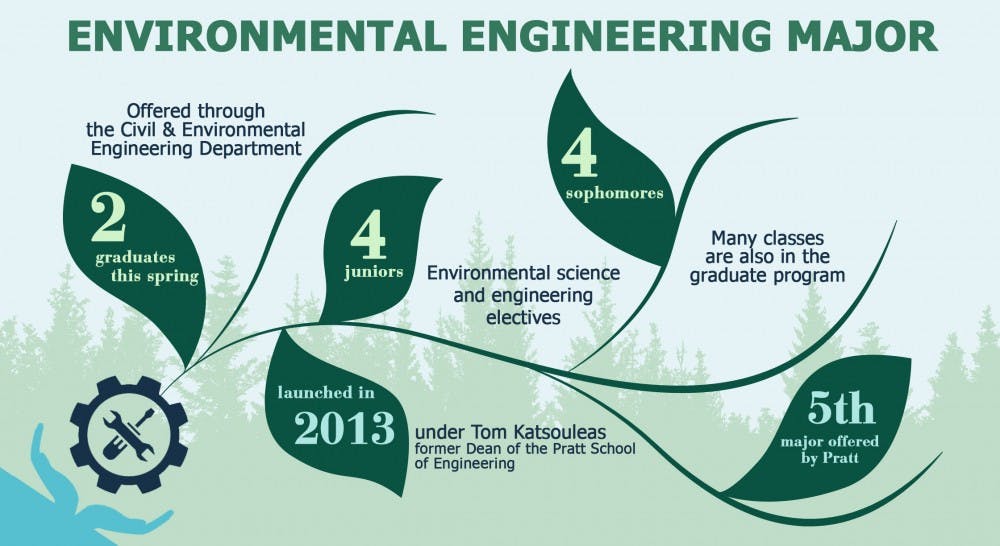Duke’s Environmental Engineering major will graduate its first class of two students this spring.
The program—offered through the Civil & Environmental Engineering Department—was launched under former dean of the Pratt School of Engineering Tom Katsouleas in Fall 2013. The major seeks to combine chemistry and biological science with public health engineering applications. To earn the degree, students must complete the 19 general engineering requirements—including chemistry, physics and math courses, as well as additional environmental science and engineering electives. It became the fifth major offered by the Pratt School.
Senior Sammie Thomas, one of the two graduating students with the major, wrote in an email that she became interested in the field after the 2010 Deepwater Horizon Oil Spill.
“I wanted to be the one there, on the scene figuring out a way to clean up the mess,” she wrote. “That is when I decided to study environmental engineering.”
Thomas—who also plays on the varsity women’s soccer team—wrote that she had to make up her mind to come to Duke early due to the athletics process. Several teachers encouraged her to commit to the field because of her strengths in math and science.
There are currently four juniors and four sophomores enrolled in the major, although more sophomores are expected to potentially enroll as they declare their majors over the next several months, wrote Joseph Nadeau, associate professor of the practice and director of undergraduate studies for Civil & Environmental Engineering.
“The EnvE major shares a number of requirements in common with the environmental track within the civil engineering (CE) major but differs in the ability to select a number of electives which can be tailored to suit the student’s particular interests within environmental engineering and environmental science,” he wrote in an email.
The Pratt School does not currently have plans to add further major programs, though options are studied periodically based on faculty expertise and student demand, explained George Truskey, R. Eugene and Susie E. Goodson Professor of Biomedical Engineering and senior associate dean for research. Pratt’s other engineering majors are biomedical, civil, electrical and computer and mechanical. The school added energy engineering as a minor in 2013.
“We want to make sure that students who graduate from the school have an opportunity to select from a number of options. Those majors that are able to give students the background and technical knowledge to tackle the major environmental problems facing society that was part of the motivation for its creation,” Truskey said.
The program began using current faculty, many of whom already had expertise in the area and teach courses in civil engineering or in Duke’s graduate-level environmental engineering program. Many of the classes are also in the graduate program, which Thomas explained has its advantages.
“Getting to learn and study alongside people with more exposure to a topic can be intimidating, but it is a great learning environment,” she wrote. “It also fosters connections between the grad and undergraduate school.”
New hires will be evaluated if more students enroll in the program, Truskey said.
Being one of two students graduating with the major does have its disadvantages, Thomas wrote. Although classes are small, many companies do not attend career recruiting events. She noted, however, that faculty provide extra support to compensate.
Nadeau wrote that many environmental engineering graduates will go directly into the engineering field or to further studies after graduation.
“Engineering, in general, is a field of study which makes available many employment opportunities post-graduation,” he wrote. “I can’t speak for our current graduates but I would anticipate that a passion for the environment is a common trait and that graduate school in environmental engineering will be a popular direction for many EnvE graduates.”
Thomas plans to work in consulting as an environmental remediation engineer, then return to school for a master’s degree. She noted that she was looking forward to being part of the first graduating class.
“It is an honor to be a part of the first class,” she wrote in an email. “It is exciting to know that we are just the first of many that will follow.”
Get The Chronicle straight to your inbox
Signup for our weekly newsletter. Cancel at any time.
Adam Beyer is a senior public policy major and is The Chronicle's Digital Strategy Team director.

